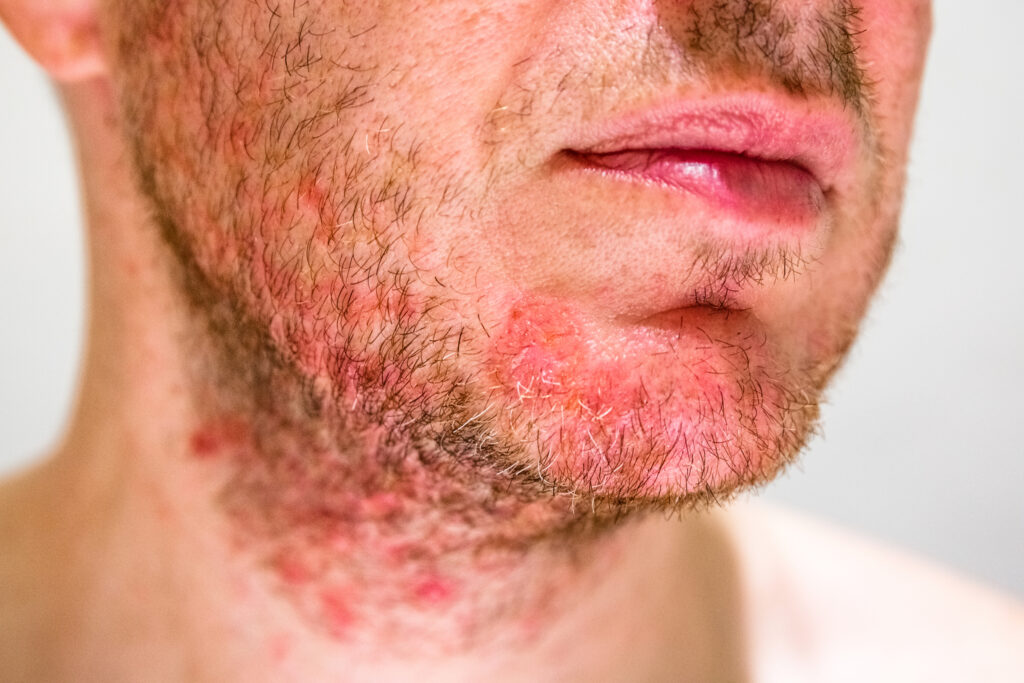Perioral Dermatitis
Do you have a scaly or red bumpy rash around your mouth?
If yes, you may have perioral dermatitis. Affecting one in 100 women, episodes of perioral dermatitis can last for several weeks and even months, and relapse is common. Fortunately, if you suffer from this skin condition, there are several treatment options available, some of which can be bought over the counter without the need for a prescription.
Read on to discover
- What is perioral dermatitis?
- What are the most common symptoms of perioral dermatitis?
- What areas of the body are affected by perioral dermatitis?
- Who is affected by perioral dermatitis?
- What are the main causes of perioral dermatitis?
- What triggers perioral dermatitis?
- How is perioral dermatitis diagnosed?
- Is perioral dermatitis contagious?
- What is the best perioral dermatitis treatment?
- What products to avoid using on perioral dermatitis?
- How to live with perioral dermatitis?
- Perioral dermatitis FAQs
What is perioral dermatitis?
Perioral dermatitis is a skin condition that manifests itself as an inflammatory rash on the skin around the mouth. Although it can affect both men and women of all ages, it is most prevalent in women aged between 15 and 45.
In some cases, the rash can spread up to the nose area and the skin around the eyes. This is known as periorificial dermatitis. Each episode of perioral dermatitis can last several weeks and even months in some cases. This condition is often chronic, and relapses are common.
What are the most common symptoms of perioral dermatitis?
The most common symptoms of perioral dermatitis are as follows:
- Rash of red bumps around the mouth
- Rash of red bumps in the fold of the nose and around the eyes
- Burning or itching
- Bumps that contain pus or fluid
- Some people also experience red bumps on the forehead or under the chin.

What areas of the body are affected by perioral dermatitis?
Perioral dermatitis primarily affects the mouth area, but some people also experience:
- Perioral dermatitis nose
- Perioral dermatitis eyes
- Perioral dermatitis forehead
- Perioral dermatitis on face
Who is affected by perioral dermatitis?
People of all ages can be affected by perioral dermatitis, including children. However, it is most common in women aged between 15 and 45.
It is thought that 1 in 100 women are affected by this skin condition. Although perioral dermatitis is uncommon in men, as more males start to use facial skincare products, the number of men experiencing perioral dermatitis is rising.
What are the main causes of perioral dermatitis?
Although the exact cause of perioral dermatitis is unclear, there are certain factors that increase your risk of developing this skin condition. These are:
The use of steroid creams
People who use steroid creams or ointments are much more likely to develop perioral dermatitis. The use of these creams can also make the symptoms of this skin condition worse.
In some people, steroid creams can treat mild perioral dermatitis temporarily, only for it to return with more severe symptoms.
Harsh cleansers and cosmetics
Make-up, cleansers, and other cosmetic products that are applied directly to the face can all cause perioral dermatitis. This is particularly likely if the products in question contain harsh chemicals or strong perfumes.
Environmental factors
Environmental factors such as cold weather and exposure to UV light can make you more prone to developing perioral dermatitis.
Fluoridated products
Products that contain fluorides, such as some toothpastes and chewing gum can trigger perioral dermatitis in some people.
Bacteria and fungus
Bacteria and yeast that live on the skin and in the hair are a potential cause of perioral dermatitis.
Contraceptive pills
Oral contraceptive pills, known more commonly as birth control pills, can be responsible for outbreaks of perioral dermatitis in some women.
What triggers perioral dermatitis?
If you suffer from frequent perioral dermatitis outbreaks, it can be beneficial to find out what are the most common perioral dermatitis triggers. These are:
- The use of a steroid cream on the face
- Certain makeup and other cosmetics
- Bacterial or fungal infections
- Constant drooling
- The use of fluorinated toothpaste
- The use of birth control pills
- Some sun creams and lotions
How is perioral dermatitis diagnosed?
Your GP or a dermatologist can diagnose perioral dermatitis by carrying out an examination of your skin. You will also be asked about your medical history.
If there is any uncertainty about your diagnosis, then your GP may take a skin culture test to rule out any possible infection. This does not hurt and involves taking a swab of a small patch of the affected skin. This is then sent to a lab for further examination.
In some cases, your GP may also perform a skin biopsy. This is likely if your skin has not responded to any treatments for perioral dermatitis.

Is perioral dermatitis contagious?
Perioral dermatitis is not contagious, which means it can not be passed from one person to another.
What is the best perioral dermatitis treatment?
There are several treatments available for perioral dermatitis depending on the severity of your symptoms, which areas of the body are affected and how often you experience relapses.
The most effective treatments for perioral dermatitis are as follows:
Over the counter treatments
There are several over the counter treatments that you can try to reduce your symptoms and lessen the number of perioral dermatitis outbreaks. Ointments such as Locobase Eczema Cream or Locobase Repair will soothe the symptoms and are cortisone free.
Gentle skincare products
To help your skin heal from perioral dermatitis, you should swap your current skincare and makeup products for gentler ones.
If you wear makeup, it can be a good idea to look for fragrance-free, light products that are less likely to irritate the skin. Avoid any makeup products that contain harsh chemicals or strong scents.
Lifestyle changes
As well as medications, lifestyle and diet changes can be highly effective in the management of perioral dermatitis.
Some of the most effective diet and lifestyle changes for treating mild perioral dermatitis are:
- Swap harsh face scrubs and washes for mild soap and warm water
- Avoid using steroids creams which can irritate the skin
- Stop applying makeup on the affected areas
- Wash your pillowcases and towels frequently
- Limit your intake of spicy and salty food, which can irritate the skin around the mouth
Prescription medications
If you have severe perioral dermatitis or you have not had success using a perioral dermatitis over the counter treatment, then you can ask your GP about prescription medications.
The most common prescription medications for perioral dermatitis are:
Immunosuppressive creams or ointments such as pimecrolimus or tacrolimus
- Topical ivermectin
- Topical antibiotics such as metronidazole
- Oral antibiotics such as doxycycline or tetracycline
- Oral antibiotics are usually only prescribed for severe cases of perioral dermatitis.
What products to avoid using on perioral dermatitis?
Although moisturisers can be beneficial for people who suffer from perioral dermatitis, there are certain products that can make your symptoms worse. These include:
Antifungal treatments
If you are tempted to use an antifungal treatment to treat perioral dermatitis, then you should know that treatments such as miconazole and clotrimazole may make your skin condition worse.
This is because not all cases of perioral dermatitis are caused by a fungal infection.
Steroid creams
Steroid creams may seem like a good treatment for perioral dermatitis as they are readily available and inexpensive. However, this can sometimes be the cause of perioral dermatitis.
If you are using steroid cream for another condition and you develop perioral dermatitis, then let your GP know, and they should be able to prescribe an alternative treatment.
How to live with perioral dermatitis?
Perioral dermatitis is often a long-term and chronic condition that can be difficult to live with. If you suffer from chronic perioral dermatitis, it can be a good idea to research as much as you can about this condition to find the right treatment plan for you.
Some people experience the best results using a prescribed medication or over-the-counter treatment, whereas others favour a more natural approach.
If you are struggling with your self-esteem due to perioral dermatitis, it can be helpful to join an online forum created for people living with this condition or read blogs written by people with perioral dermatitis.

Perioral dermatitis FAQs
What triggers perioral dermatitis?
Perioral dermatitis is often triggered by both topical and inhaled steroids. Flare-ups can also occur due to the application of makeup or the use of heavy moisturisers. Other common triggers are fluoride toothpastes, sun creams, and the use of birth control pills.
How do you get rid of perioral dermatitis?
There are several treatments for perioral dermatitis, including topical creams, antibiotics, and lifestyle changes such as not wearing makeup during flare-ups and using gentle skincare products.
What is the fastest way to cure perioral dermatitis?
The fastest way to treat perioral dermatitis is with antibiotics. These can be taken orally or applied topically to the affected area. For optimum results, combine antibiotics with moisturisers designed to soothe the symptoms of dermatitis.
What foods trigger perioral dermatitis?
Although there are no foods that trigger perioral dermatitis outbreaks, there are certain types of foods and drinks that can exacerbate your symptoms, including spicy foods, salty foods, hot drinks, alcohol, dairy products, tomatoes, and citrus fruits.
Does perioral dermatitis go away by itself?
Perioral dermatitis can sometimes go away on its own, especially if the cause of your flare-up is the use of steroid creams and you stop using these. However, in many cases, prescribed or over the counter medications are needed.
Is perioral dermatitis a fungus?
Perioral dermatitis is most commonly caused by the overuse of topical steroids. However, some medical professionals believe it could be caused by a fungus known as candida Albicans. It is not recommended to use antifungal medication to treat perioral dermatitis as this can make your symptoms worse.
How long does a perioral dermatitis flare-up last?
The length of an episode of perioral dermatitis can vary from person to person. Some people notice that their symptoms go away in as little as a week, whereas others can be affected for several months.
To reduce the duration of perioral dermatitis flare-ups, it is often a case of trial and error to see which treatment works best for you. See your GP to create a bespoke treatment plan.
Does moisturiser help perioral dermatitis?
Moisturisers can help to treat perioral dermatitis as long as you pick the right ones. Look for a perioral dermatitis cream that is gentle on the skin. Avoid moisturisers that contain harsh chemicals and ones that are scented. You should not use steroid creams as these can make the symptoms of perioral dermatitis worse.
Is aloe vera good for perioral dermatitis?
Yes, aloe vera can help to soothe some of the symptoms of perioral dermatitis, such as itching and inflammation. As a natural moisturiser, aloe vera can be applied to any areas affected by perioral dermatitis without fear of further irritation.
What vitamins are good for perioral dermatitis?
Vitamin C, D, and E may be beneficial for perioral dermatitis as these vitamins are known for improving the appearance of the skin.
Links & Sources
- Link item one
- Link item two
- Link item three
No products found